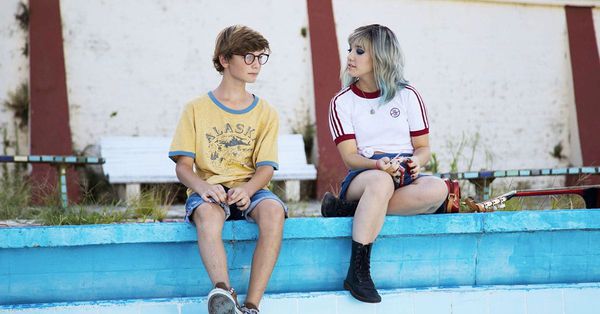Eye For Film >> Movies >> A Trip To The Moon (2017) Film Review
A Trip To The Moon
Reviewed by: Jennie Kermode

Adults, looking back wistfully on childhood, often describe it as a magical time when anything seemed possible. What they tend to lose sight of is the way this wealth of possibilities stems from chaos. Life is rarely more confusing, absurd and unfair. Early on in this film, young Tomás (Ángelo Mutti Spinetta) is accosted by a bully just for walking towards his own home, because it happens to be close to the bully's girlfriend's home. What follows seems to be primarily a source of entertainment for the bully, who doesn't view this skinny kid half his size as a serious threat. Fortunately he doesn't know that Tomás watches his girlfriend - Iris (played by Ángela Torres) - through his telescope.
There's no serious voyeurism here, just hopeless longing. The real reason why Tomás has the telescope is for watching the skies - especially the Moon, which is a constant source of fascination for him. Travelling up there is his imagination, he can escape the crowded urban spaces where he feels vulnerable, escape the hectic family home where he feels under constant pressure. The psychiatrist his mother sends him to recommends that the family indulge his fancies, but is unaware of the secret that lies behind his need to escape. Soon he will take them all on a trip to the Moon in order to confront it.
This carefully constructed début feature from Joaquín Cambre, who made his name with music videos and has a good sense of the emotional complexities of adolescent lives, plunges us into Tomás's story amid a multiplicity of others. Every friend and family member seems to have something going on and we are invited to share Tomás' sense of dislocation, to understand the vulnerability he feels when nobody who isn't paid really has time to pay attention to him. Iris taking an interest might have helped but brings with it an additional flood of emotions which threaten to destabilise him further. At the same time, it's unclear if he really does need the antipsychotic medication that he's prescribed - medication which produces disorientating effects of its own. He doesn't seem to be a danger to himself or anyone else, he's quite capable of functioning on a day to day basis even when faced with exam pressure, and his eventual mental break seems less like a crisis than a spontaneous coping mechanism, a means through which to slow everything down and address it on his own terms.
There's a hint of magical realism here, though the viewer is never seriously expected to share Tomás' perceptions, merely to respect them. The focus of the film is much more on his internal character arc and on interactions between people. Cambre uses physical space well to illustrate mental pressures or relief therefrom, and moves characters in and out of frame so that in busy scenes we're constantly being interrupted or having to look past people to see what's going on. It's only in the final scenes that our young hero really begins to take up space and own it.
Despite the originality of the central journey, there's a lot here that will feel very familiar to viewers, and not always in a positive way. Nevertheless, the light touch that Cambre brings to the drama gives it undoubted charm, Spinetta is impressive in a role that requires him to be in almost every scene, and there's a sweetness about the story that many viewers will find endearing - without any pretence that being young is easy.
Reviewed on: 18 Mar 2019
















